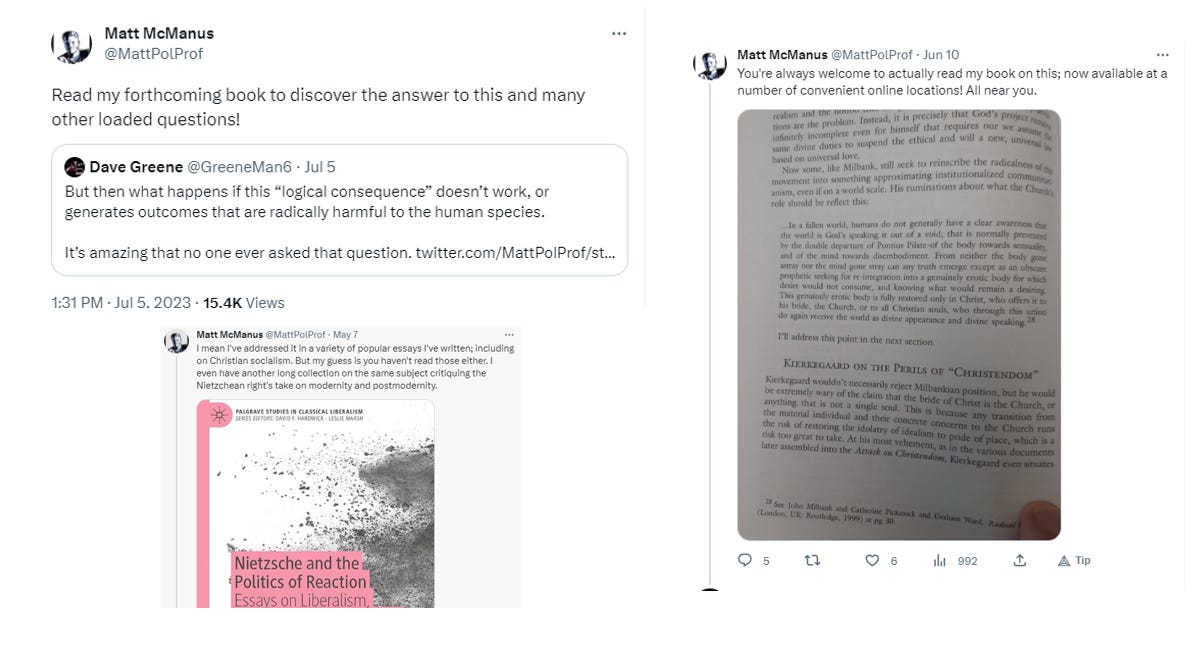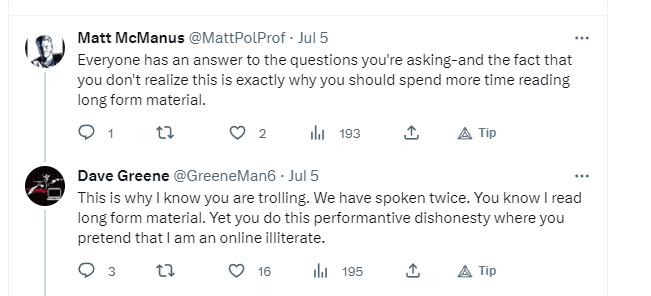Leftism's Not Dead
My final retrospective on Professor McManus
I don't like to revisit old dialogues. Nevertheless, something about my recent interaction with online leftist Matt McManus stuck in my craw, and I found myself revisiting some of our previous talking points. Perhaps it’s because Professor McManus is one of the few lefties trying to answer the dissident right? Whatever the reason, as things circulate, when the algo feeds me one of Matt’s tweets, it's hard to resist commenting.
But things have really gone downhill. Now, McManus and his friends have settled on a new obfuscating tactic: replying to all pushback by claiming the answer assuredly lies in one of their expensive academic tomes, available freely only to those with university library access.

The joke is obvious to anyone familiar with academia. Professors rarely say anything new in their longer-form work, much less address topics that they studiously avoid in other contexts. For the most part, these volumes are rewrites of the author's public thesis with larger bibliographies and a much bigger price tag. Still, it’s enough for Matt and his gang of pedants to point and scoff at the pleb who doesn’t want to drop a cool Benjamin to preorder a textbook on the off-chance it might contain a new argument.
As an aside, does anyone else find it odd how the condescension of modern leftists so resembles that of the Bush-era neo-cons?
For those old enough to remember, the neo-cons in their prime always responded to uncomfortable questions by "pulling rank" and putting down their opponents. Whether the question concerned the wisdom of the Iraq War, or the competence of the Bush administration, somehow the neo-con's opponent never had standing to bring their contention. You always needed to work harder, be more patriotic, grow up, earn more money, or put the mileage in, to have a proper opinion. Maybe after you did all that, you might have the maturity to see things their way.
Who knows.
Irony aside, the conversation with McManus seemed to come full circle when, at the end of his usual condescension, Matt punctuated his response with the accusation that I didn't read "long form books", a statement he knows to be false.

This I think is where I must leave the conversation with McManus permanently. I know Matt's better than this, but I can't be bothered to dig any deeper. Academic bloviating is one thing, but deliberate mischaracterization is another; the Mendoza line of acceptable discourse.
I suppose this bolsters the original point of my essay, that modern academics find themselves in a bind when facing the right. Always needing to misrepresent their opponents to sell clicks and secure their positions, leftist authors can never get to the heart of the issues that divide us politically.
In his more introspective work, Matt understands that right-wing thought embodies a deep and ancient philosophical tradition comprising many of the greatest writers and thinkers throughout the centuries. He also knows (how could he not) that the modern right who follows this tradition is largely educated and sincere; and that this growing group of dissidents also includes a number of former leftists, well versed in the progressive tradition and still convinced of its flaws.
Still, you'd have a hard time finding this understanding in any of Matt's more public-facing articles, which always insinuate that modern right-wingers are a bunch of illiterate chan-board trolls, motivated by pure hatred, bearing only a coincidental resemblance to the older intellectual authors of yore. In this frame, there is no need to engage with these malcontents, they're all bad actors, just move along and leave dealing with right-wing ideas to the experts!
It's sad to see what could have been a good intellectual dialectic die. But that's not what the modern left wants. They don't want to talk or think about hard ideas. That's too tiring. All modern progressives want is a cut-and-dry morality play with a Marvell movie veneer: good guys versus bad guys, in appropriately colored spandex, and the assurance that their side always wins, and is always right in winning.
Is that too much to ask?
If anything, conversations with modern progressives take me back to the old “atheism vs theism” debates. looking back, What struck me most about those endless conversations were not the arguments involved, but the psychological needs that drove each side. Of course, there was the desire for deconstruction on the skeptic side (which I have spoken about at length). But what is often unremarked upon is the deep insecurity of the Christians. Even as an atheist, I could smell a certain desperation in the vicinity of the theists. They felt defensive, like they needed a "win" a little too much, and didn't want to be questioned too closely.
Christians were supposed to be the ones in possession of the promise of eternal life. Yet oddly, it seemed like they were seeking the atheist's approval more than the other way around.
You could see this too, in the types of arguments that Christians gravitated towards, which I always thought missed the real point of the atheist position. Christian leaders were obsessed with apologetic arguments, which were largely linguistic in form and that depended, almost entirely, on axiomatic presuppositions. But they disregarded the elephants in the room: the ever-present problem of theodicy of course, but also the more pressing reality that classic religion was unsuited to modernity, and out of sync with the visions of the taste-makers and ruling class of the West.
These were the forces driving apostasy in the 2000s. But you could listen to hours of God-debate dialogue and never hear an answer to those more fundamental psychological concerns, looming in the background.
It's not that there weren't answers to these problems. There just weren't any EASY answers to these problems. And that's not what the audience of comfortable less-dedicated Christian believers wanted to hear. They wanted something simple, something affirming, something validating to convince them that they were on the right side of things, destined to win.
What they wanted was God’s Not Dead, a 2014 movie that seemed to perfectly embody the God-debates as the moderate Christian middle class would have wanted them to be. In this didactic film, atheists were bitter, ill-informed, and bigoted. Easily defeated by the right argument, delivered simply and succinctly by a protagonist who just needed to stand up for himself and assert the truth. Every good person was converted to the "right way" of thinking, with no messy issues of doubt, or uncomfortable questions about the modern world that would unsettle the sensibilities of its middle-class Christian audience.
And the "Marvel movie" rehash of the God debates did its thing. It sold like hotcakes. But it was also the last thing the Christian community needed: a comforting assurance of well-being obfuscating a crisis that was never addressed.
After all, the purpose of media is to inform, right? Who wants to discover later, in battle, that their enemy is much stronger than they were told? Who wants to persist in delusion ignoring the contradictions rife in their own lifestyle?
A middle-class Christian kid going off to college, would almost certainly not experience the cartoony morality play depicted in God’s Not Dead. And parents expecting to persist both in their faith and comforting American normality were in for another thing.
What did Christianity need in the 2000s? It needed a wake-up call. Christianity needed to come to terms with its alienation from the modern world and to be comfortable with that alienation. It needed to grapple with the hard questions of modernity, and the reality that it was now “weird” to be Christian. It needed to follow the hard path that Rod Dreher pointed to but couldn't, himself, walk.
I guess I am comforted by the fact that Christian leadership is coming around to this perspective now, at this very late date. Really, we should have come to these conclusions decades ago. Better late than never. But I find it hard to be charitable to those who encouraged our complacency.
And I guess that's also where I see the great tragedy of Matt McManus’s leftism.
No, I don't think leftism is dead, not entirely. Something of its form is needed for the future. A synthesis must occur for the future of humanity to begin again. But progressive ideas need to be radically transformed. Leftism, as a general persuasion, needs to come to terms with the realities of the modern world, just like Christianity is starting to do.
But I know that is a tall order.
However, if there is a way to conclude my last discourse with the left, I will take this opportunity to address Professor McManus directly, on the off-chance that he is reading this.
Matt,
I know you are better than you let on. I know you see the problems that I am seeing. I know that you know there is substance to the problems your enemies are trying to address. Why hide this knowledge under a bushel?
I know the reality of modern politics is dark and complicated, and I know Your audience doesn't want to hear that. But isn't discussing hard truths the job of an intellectual? And here the truth needs to come out. If not for your edification, then for your audience and your students.
It's not that there are no good ideas on the left. But how can we go on pretending to believe this long list of absurdities?
That the "Nordic Model" pushed by people like Justin Trudeau and Nancy Pelosi is a surefire path to fixing modern social ills?
That de-policing creates safe cities and healthy urban communities?
That libertine attitudes towards sex and drugs benefit community health?
That exposing children to rank sexuality is good, as long as it's prefaced with rainbow flags and alphabet acronyms?
That “workplace democracy” is a panacea for the ills of managerial techno-Capital?
That progressive social norms lead to good mental health and thriving families?
We might as well come clean about these untruths, and be more honest about the complex reality of our situation, as messy and right-wing as it is.
People are going to figure out the truth one way or the other. If not through direct argument, then through experience, if not through experience then through contact with people who think and act differently.
You know, those dangerous reactionaries you warn people about? Believe it or not, we aren't the mouth-breathing 4chan trolls you describe in most of your work. We are professionals, family men ..and women, educators, academics in our own right, community builders, and increasingly leaders.
No, we don't have money or access to the academic sinecures you covet. But we possess a spirit, of camaraderie and indeed frankness you will find distinctly lacking in more left-leaning communities organized around clout, drama, and political backbiting. It's amazing how refreshing the alternative can be, especially when it has been so long misrepresented.
Is this admission too embarrassing? Maybe. Being open to these types of discussions certainly won't help your career. But someone still needs to represent what goodness remains from the old leftist dream. So, we will keep a chair at the table waiting, if not for you, then for a progressive humble enough to begin the conversation in earnest.
Because just as there is no authentic Christianity not deeply alienated from the modern world. There is no authentic leftism not deeply humbled by its catastrophic failures across the last two centuries. Because while leftism might yet have some life in it, this Marvel movie cartoon of an uber-competent technocratic liberal socialism is certainly dead.
And dead things rot, like fish, from the head down.